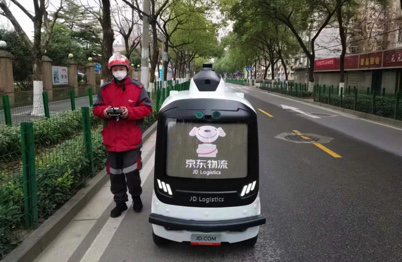JD Logistics prepares to launch robots and drones in sickened Wuhan
Chinese e-commerce marketplace operator JD Logistics is turning to robots and drones in its continuing effort to sustain last-mile parcel delivery service in the country's Wuhan city despite the outbreak of a deadly virus.
The company is also running its automated warehouses 24 hours a day to meet a spike in demand by Chinese consumers who see online shopping as the safest way to get goods while protecting themselves from the coronavirus. The number of daily orders processed by these automated warehouses has increased from an average of 600,000 to 1 million between Jan. 24 and Feb. 2, according to JD.
Check out the video of #JD first delivery via autonomous delivery robot in #Wuhan. #coronavirus pic.twitter.com/P7OINpwYV7
— JD.com (@JD_Corporate) February 6, 2020
The company said yesterday it was still committed to delivering medical and epidemic-prevention supplies such as masks, medical gloves, goggles, and disinfectants, to major hospitals in the region. To avoid infecting its parcel carriers, the company has issued hygiene supplies to delivery workers, and launched frequent disinfection of its trucks and warehouses.
Those steps are necessary to combat the impact of a coronavirus that has killed hundreds, sickened thousands, and panicked millions. The disease is also wreaking chaos on the supply chains of many companies by closing factories and delaying shipments.
In order to continue parcel delivery operations in that context, JD Logistics is now testing the use of its autonomous delivery robots in Wuhan, and making preparations for drone delivery of medical supplies in China, the company said today. By turning to advanced technology, the company can reduce the human-to-human contact that can spread the coronavirus, while still ensuring normal operations of its logistics facilities and last-mile delivery, JD said.
The company did not offer details of the types of robotic vehicles it had deployed, but released a photograph of a delivery worker dressed in a face mask, using a remote control device to steer a refrigerator-sized, rolling bot down a deserted street.
Likewise, JD did not share details of its warehouse automation, but said those facilities are "highly efficient fulfillment centers that integrate intelligent logistics technologies such as artificial intelligence (AI), deep learning, and image recognition, with over 70 varying degrees of automation, depending on need."
A third layer of automation being used to avoid human contact during the spread of the disease is the company's unmanned convenience store. Known as the JDX Mart, the shop offers consumers in Guilin, Shenzhen, and Dongguan a contactless way to get their everyday convenience store products while reducing the risk of infection, JD said. Launched in 2017, the unmanned facility enables consumers to enter the store by scanning a code, take the products they want to buy, and exit without stopping at any checkout counter to make payment.
Related Articles
Copyright ©2024. All Rights ReservedDesign, CMS, Hosting & Web Development :: ePublishing